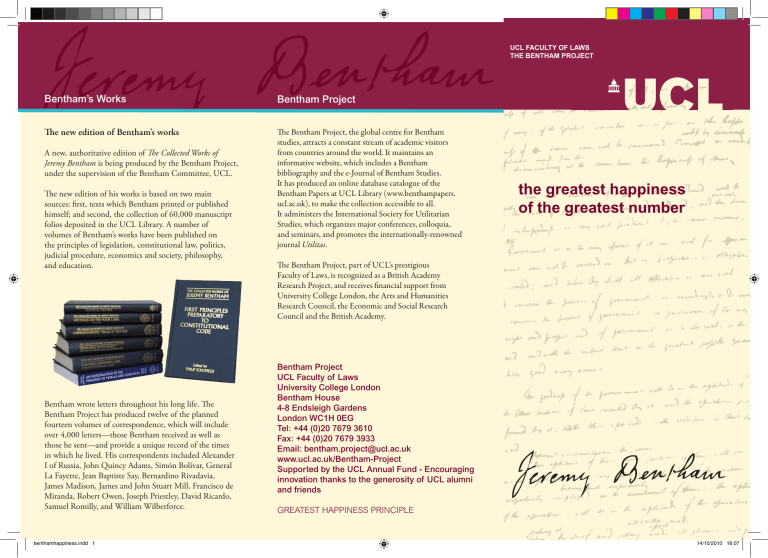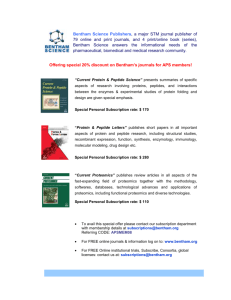Bentham’s Works Bentham Project The new edition of Bentham’s works

UCL FACULTY OF LAWS
THE BENTHAM PROJECT
Bentham’s Works
The new edition of Bentham’s works
A new, authoritative edition of The Collected Works of
Jeremy Bentham is being produced by the Bentham Project, under the supervision of the Bentham Committee, UCL.
The new edition of his works is based on two main sources: first, texts which Bentham printed or published himself; and second, the collection of 60,000 manuscript folios deposited in the UCL Library. A number of volumes of Bentham’s works have been published on the principles of legislation, constitutional law, politics, judicial procedure, economics and society, philosophy, and education.
Bentham Project
The Bentham Project, the global centre for Bentham studies, attracts a constant stream of academic visitors from countries around the world. It maintains an informative website, which includes a Bentham bibliography and the e-Journal of Bentham Studies.
It has produced an online database catalogue of the
Bentham Papers at UCL Library (www.benthampapers.
ucl.ac.uk), to make the collection accessible to all.
It administers the International Society for Utilitarian
Studies, which organizes major conferences, colloquia, and seminars, and promotes the internationally-renowned journal Utilitas .
The Bentham Project, part of UCL’s prestigious
Faculty of Laws, is recognized as a British Academy
Research Project, and receives financial support from
University College London, the Arts and Humanities
Research Council, the Economic and Social Research
Council and the British Academy.
Bentham wrote letters throughout his long life. The
Bentham Project has produced twelve of the planned fourteen volumes of correspondence, which will include over 4,000 letters—those Bentham received as well as those he sent—and provide a unique record of the times in which he lived. His correspondents included Alexander
I of Russia, John Quincy Adams, Simón Bolívar, General
La Fayette, Jean Baptiste Say, Bernardino Rivadavia,
James Madison, James and John Stuart Mill, Francisco de
Miranda, Robert Owen, Joseph Priestley, David Ricardo,
Samuel Romilly, and William Wilberforce.
benthamhappiness.indd 1
Bentham Project
UCL Faculty of Laws
University College London
Bentham House
4-8 Endsleigh Gardens
London WC1H 0EG
Tel: +44 (0)20 7679 3610
Fax: +44 (0)20 7679 3933
Email: bentham.project@ucl.ac.uk
www.ucl.ac.uk/Bentham-Project
Supported by the UCL Annual Fund - Encouraging innovation thanks to the generosity of UCL alumni and friends
GREATEST HAPPINESS PRINCIPLE
the greatest happiness of the greatest number
14/10/2010 16:07
Bentham’s Life
‘The greatest happiness of the greatest number is the only right and proper end of government.’
Bentham Papers, UCL
Jeremy Bentham (1748–1832) trained as a barrister, but rather than practising law, he realized that he had ‘a genius for legislation’, and devoted himself to the promotion of reform. The proper purpose of law, as of all human action, was to promote utility, or to use the more famous formulation – the greatest happiness of the greatest number. This statement appeared in An
Introduction to the Principles of Morals and Legislation in 1789.
Bentham used the principle of utility as a critical tool by which the value of laws, institutions, practices, and beliefs could be tested, and if found wanting, improved.
© COPYRIGHT UCL Library Services
BENTHAM BY ROBERT MATTHEW SULLY, 1827
In the 1790s Bentham attempted to persuade the British government to build a panopticon prison, with himself as governor. When the scheme collapsed in 1803 he became increasingly committed to radical politics. He began writing on parliamentary reform in 1809, and went on to call for the
‘euthanasia’ of the Church of England and the abolition of the monarchy and aristocracy. Impressed by the political system of the United States, he adopted an overtly republican and democratic stance in the 1820s, culminating in Constitutional
Code (1830).
Bentham’s Writings
Works published in his lifetime include: –
1776 A Fragment on Government
1787 Defence of Usury
1789 An Introduction to the Principles of
Morals and Legislation
1791 Panopticon: or, The Inspection-House
1802 Traités de législation civile et pénale
1808 Scotch Reform
1811 Théorie des peines et des récompenses
1816 Chrestomathia
1816 Tactique des assemblées législatives
1817 Plan of Parliamentary Reform
1818 Church-of-Englandism
1822 Codification Proposal
1825 Indications respecting Lord Eldon
1827 Rationale of Judicial Evidence
1830 Constitutional Code
© COPYRIGHT UCL Library Services
PLAN OF THE PANOPTICON BY WILLEY REVELEY
Bentham’s Legacy
Democracy Bentham laid the theoretical foundations for a secular, rational, democratic society.
Philosophy Classical utilitarianism, founded by Bentham, inspired the movement known as philosophical radicalism whose doctrines have continued to exercise great influence in political philosophy.
Law Distinguishing sharply between law as it is and law as it ought to be, he inspired the proponents of the doctrine of legal positivism. In his extensive and detailed writings on judicial procedure, he elaborated the most comprehensive theory of evidence in the Anglo-American tradition.
Politics He produced both the earliest utilitarian defence of political equality, and a sophisticated and detailed blueprint for representative democracy.
Economics He developed a method of calculating the potential utility of actions which forms the basis of cost benefit analysis.
Welfare state His proposals for dealing with poverty provided the intellectual basis for the Poor Law Amendment Act of 1834, and for the welfare state more generally.
Education His educational ideas, based on ‘useful learning’ and
access for all regardless of religion or gender, inspired the founders of the University of London in the mid-1820s.
By contrast the Universities of Oxford and Cambridge were open only to Anglican men.
Surveillance His panopticon prison scheme is the starting-point for modern theories of surveillance.
Peace His scheme to promote peace between nations advocated an international court of arbitration and a proportional reduction of armed forces. The word ‘international’ was coined by Bentham.
benthamhappiness.indd 2 14/10/2010 16:08



